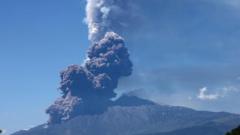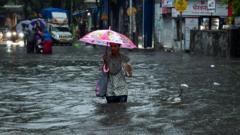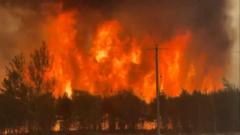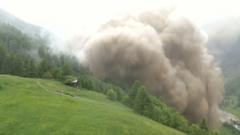As wildfires consume vast regions of Canada, approximately 17,000 evacuees from Manitoba face urgent relocations, while Saskatchewan grapples with extreme fire conditions. Authorities struggle against the growing threat as international aid is sought.
Urgent Evacuations Underway as Wildfires Rage Across Canada

Urgent Evacuations Underway as Wildfires Rage Across Canada
Massive wildfires in Manitoba and Saskatchewan force thousands to flee, raising concerns about air quality and climate impact.
Fast-moving wildfires have prompted the evacuation of over 17,000 residents from Manitoba as the flames swiftly consume vast areas. With more than 188 active fires reported across Canada, military aircraft and helicopters have been deployed to assist those in remote locations, especially in northern communities. The situation worsened as hot and dry weather is expected in the forthcoming days, exacerbating fire conditions.
Both Manitoba and Saskatchewan have declared states of emergency, with the latter reporting that 17 wildfires are actively burning, eight of which remain uncontrolled. Saskatchewan Premier Scott Moe cautioned during a press briefing that as dry weather persists, the number of evacuees might reach up to 10,000. "The next few days are critical," he stated, referring to the urgent need for significant rainfall to provide relief.
Evacuations in Alberta and British Columbia have also escalated as the fires spread. Authorities have deemed the evacuation of the First Nations community of Pukatawagan a rapidly evolving crisis. Prime Minister Mark Carney expressed high regard for the efforts of the military and local rescue teams, emphasizing the enormous scale and complexity of the evacuations. In Flin Flon, Manitoba, a city of approximately 5,000, only essential firefighting personnel remain as most residents have fled.
Manitoba is currently managing 25 active fires, 11 of which are classified as uncontrollable. Danielle Desjardins, a meteorologist, highlighted the dismal forecast for the region, stating that while some areas might experience a cold front, it won't alleviate conditions in fire-affected zones. Windy conditions accompanying this weather front, combined with ongoing heat and dryness, drastically increase the risk of fire spread.
Notably, smoke from these wildfires has produced air quality alerts affecting around 22 million Americans this weekend, with northern Minnesota residents warned of hazardous smoke levels. Canada is already reeling from its gravest wildfire season on record in 2023, with over 42 million acres burned. Experts underscore that climate change is intensifying the frequency and severity of conditions conducive to wildfires, creating an increasingly perilous scenario for both Canadians and neighboring U.S. states.





















